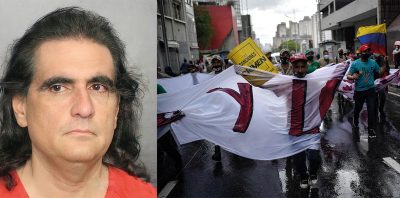Alex Saab, Hostage of the Hybrid War Against Venezuela
The case is a terrifying example of the US’s continuing commitment to illegal, unilateral intervention and 'regime change,' where no country is truly safe, writes FRANCISCO DOMINGUEZ

All Global Research articles can be read in 51 languages by activating the Translate Website button below the author’s name.
To receive Global Research’s Daily Newsletter (selected articles), click here.
Click the share button above to email/forward this article to your friends and colleagues. Follow us on Instagram and Twitter and subscribe to our Telegram Channel. Feel free to repost and share widely Global Research articles.
***
June 12, 2023 was the third anniversary of the illegal kidnapping and imprisonment by the US of Alex Saab.
Because the brutality and cruelty of the US blockade was wreaking havoc on the economy and millions of the most vulnerable in Venezuela were being deliberately denied their human rights to the most basic necessities of daily life, President Nicolas Maduro tasked Saab with travelling around the world procuring food, medicines and fuel for his country.
Breaking every treaty, protocol, law and norm of international diplomacy, the US plotted to have Saab arrested while in transit to Iran to fulfil his diplomatic mission, by pressing the Cape Verde government to illegally arrest him on June 12, 2020.
The plane Saab was travelling on was denied refuelling in Morocco and Senegal thus being forced to land in Cape Verde. In his book, Never Give An Inch (2023), Donald Trump’s secretary of state Mike Pompeo admits as much:
“No other nation has the global reach to interrupt an Iran-Venezuela plot in real time and convince a small island nation to hold a wanted man.”
In March 2019, when Venezuela suffered a national blackout caused by a cybernetic attack on the national grid, Pompeo tweeted:
“No food. No medicine. Now, no power. Next, no Maduro.”
The arrest of Saab was central to the US attempt to block the supply of food, medicine and fuel to Venezuela right in the middle of the Covid pandemic. The charges against Saab are rooted in the US’s regime change policy against the Venezuelan government.
Saab’s detention in Cape Verde was carried out without a warrant and with an Interpol red notice received by Cape Verde only after his unlawful arrest.
Additionally, he was appallingly treated as verified personally by the president of the National Human Rights Commission of Cape Verde Zeida Freitas, who observed that Saab had “bruises, cuts on his wrists and ankles, and loss of teeth.” Worse still, he was denied access to medical care despite being a cancer survivor.
The Economic Community of West African States (Ecowas) declared Saab’s detention “arbitrary and unlawful” in March 2021, ordered his immediate release, an end to the extradition process and compensation for damages caused. The UN human rights commission (UNHRC) asked Cape Verde to suspend the extradition of Saab to the US while they looked at his case.
Despite this, and despite the fact there is no extradition policy between Cape Verde and the US, Saab was extradited to the US.
The extradition was carried out before the October 17 Cape Verde elections, in which presidential candidate Jose Maria Nieves had announced that upon becoming president he would act as ordered by the Ecowas ruling. Nieves won the election with a 51.7 per cent majority, but it was too late for Saab.
Under heavy pressure, Cape Verde ignored Ecowas and the UNHRC, and on October 16 a special US military force extracted Saab to Miami, where Judge Robert Scola charged him with eight counts of conspiracy to launder money, later reduced to one, a crime that carries a maximum sentence of 20 years in prison.
After a three-year investigation, a prosecutor in Geneva found no evidence of money laundering offences against Saab, therefore declaring his innocence. Furthermore, the alleged crime would have been committed outside US territory, over which Washington has no legal jurisdiction. Yet despite utterly failing to produce any evidence whatsoever, the Florida court (read: the US State Department) continues with the cruel farce of keeping Saab in prison.
Femi Falana, one of Saab’s lawyers, hit the nail on the head when she declared:
“Never before has politically motivated judicial overreach been deployed with such arrogance as in the way the US has treated Alex Saab.”
The Saab affair, being a case of brazen lawfare, is significant in that it gravely jeopardises the international order and the viability of diplomacy. No diplomat, no matter the country, is safe.
In a letter to US Secretary of State Antony Blinken, Saab’s wife Camilla Fabri wrote:
“The charges against him must be dropped and his diplomatic immunity respected.”
The only legal and moral course of action for the US government to take is to immediately and unconditionally release Venezuela’s special envoy.
*
Note to readers: Please click the share button above. Follow us on Instagram and Twitter and subscribe to our Telegram Channel. Feel free to repost and share widely Global Research articles.
Featured image: Alex Saab, after his arrest in Florida, October 16 2021 (left) and (right) Venezuelans protest at US sanctions imposed on them during the Covid crisis, May 2021 (Source: Morning Star)

